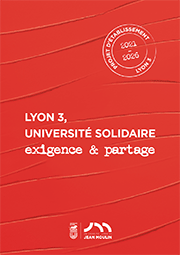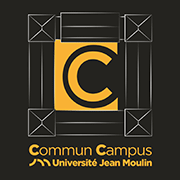AccueilRechercheProgrammes et productions scientifiquesThèsesThèses soutenuesThèses soutenues - 2006-2021Thèses soutenues - 2012
-
Partager cette page
- Recherche,
PEYRON David
La construction sociale d’une sous-culture : l’exemple de la culture GEEK
Publié le 4 janvier 2013 – Mis à jour le 18 février 2013
Thèse en Sciences de l'information et de la communicationle 11 décembre 2012
Cette étude porte sur la ? culture geek ? et son émergence en tant que sous-culture et identité culturelle revendiquée en France depuis le milieu des années 2000. En effet, ce mouvement d’abord américain a fait une entrée remarquée dans l’espace public qui incite à s’interroger sur sa réalité sociologique. Les geeks sont abordés ici comme fans de mondes imaginaires fantastiques (science-fiction, fantasy…), passionnés de nouvelles technologies et en tant que public premier et fondateur du processus de convergence culturelle théorisé par Henry Jenkins. La montée en visibilité du phénomène geek est ainsi liée dans cette étude à celle de pratiques médiatiques associées à ce processus (fanfictions, démocratisation des outils numériques, ?uvres transmédiatiques et immersives, etc.). Dans ce cadre, le tournant réflexif (vers un sentiment d’appartenance à une identité collective) et la mode médiatique autour de la culture geek ces dernières années trouvent leurs racines dans les moments fondateurs de la convergence culturelle (depuis les pulps fictions et la naissance des comic books jusqu’à la sortie de Star Wars, du Seigneur des anneaux, des premiers jeux de r?les et jeux vidéo). Mais cela doit aussi à la radicalisation récente des croisements médiatiques, des pratiques participatives, de la mondialisation des partages liée aux technologies numériques et au passage des identités prescrites aux identités choisies dans les sociétés contemporaines marquées par l’individualisme.
This dissertation is about ? geek culture ? and the emergence of this subcultural identity in recent years in France. This movement, born in North America, has entered the public sphere in a spectacular way and it encourages us to study its sociological reality. Geeks are seen here as fans of imaginary worlds (science-fiction, fantasy…), new technologies lovers, and as first and original audience of the process of cultural convergence defined by Henry Jenkins. The increasing visibility of the geek phenomenon is connected to many practices associated with this process (fanfictions, wide use of digital technology, transmedia and immersive storytelling, etc.). From this point of view, the reflexive moment (the feeling of being part of a collective identity) and the geek trend are both rooted by the beginnings of cultural convergence (from the pulp fictions, and the birth of comic books, to the release of Star Wars, the Lord of the Rings and the first role-playing or video games). It also has to do with the recent growth of links between media, with the success of participatory culture, the possibility of worldwide share thanks to digital technologies and the shift from preassigned identities to chosen ones in our individualistic society.
Mots-clés : Geek, fans, convergence culturelle, identité, sous-culture, réflexivité, science-fiction, fantasy, informatique, Internet, jeu vidéo, jeu de r?le, Star Wars, Seigneur des anneaux
Key words : Geek, fans, cultural convergence, identity, subculture, reflexivity, science-fiction, fantasy, computing, Internet, videogame, role-playing game, Star Wars, Lord of the Rings
Directeur de thèse : Jean-Pierre ESQUENAZI
Membres du jury :
Jean-Pierre ESQUENAZI, Professeur, Université Jean Moulin Lyon 3
Philippe LE GUERN, Professeur, Université de Nantes
Eric MAIGRET, Professeur, Université Paris 3 Sorbonne Nouvelle
Patrice FLICHY, Professeur, Université Paris Est Marne la Vallée
Fran?ois SINGLY, Professeur, Université Paris Descartes
Président du jury : Le Guern Philippe
Mention : Très honorable
Equipe d'accueil : ELICO
This dissertation is about ? geek culture ? and the emergence of this subcultural identity in recent years in France. This movement, born in North America, has entered the public sphere in a spectacular way and it encourages us to study its sociological reality. Geeks are seen here as fans of imaginary worlds (science-fiction, fantasy…), new technologies lovers, and as first and original audience of the process of cultural convergence defined by Henry Jenkins. The increasing visibility of the geek phenomenon is connected to many practices associated with this process (fanfictions, wide use of digital technology, transmedia and immersive storytelling, etc.). From this point of view, the reflexive moment (the feeling of being part of a collective identity) and the geek trend are both rooted by the beginnings of cultural convergence (from the pulp fictions, and the birth of comic books, to the release of Star Wars, the Lord of the Rings and the first role-playing or video games). It also has to do with the recent growth of links between media, with the success of participatory culture, the possibility of worldwide share thanks to digital technologies and the shift from preassigned identities to chosen ones in our individualistic society.
Mots-clés : Geek, fans, convergence culturelle, identité, sous-culture, réflexivité, science-fiction, fantasy, informatique, Internet, jeu vidéo, jeu de r?le, Star Wars, Seigneur des anneaux
Key words : Geek, fans, cultural convergence, identity, subculture, reflexivity, science-fiction, fantasy, computing, Internet, videogame, role-playing game, Star Wars, Lord of the Rings
Directeur de thèse : Jean-Pierre ESQUENAZI
Membres du jury :
Jean-Pierre ESQUENAZI, Professeur, Université Jean Moulin Lyon 3
Philippe LE GUERN, Professeur, Université de Nantes
Eric MAIGRET, Professeur, Université Paris 3 Sorbonne Nouvelle
Patrice FLICHY, Professeur, Université Paris Est Marne la Vallée
Fran?ois SINGLY, Professeur, Université Paris Descartes
Président du jury : Le Guern Philippe
Mention : Très honorable
Equipe d'accueil : ELICO
Documentation
Mise à jour : 18 février 2013







